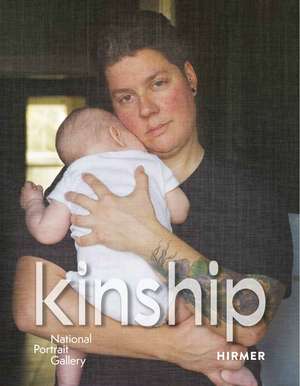Kinship
Autor Dorothy Moss, Leslie Ureña Memorii de Robyn Asleson, Taína Caragol, Charlotte Ickesen Limba Engleză Hardback – 18 dec 2022
Recent events such as the COVID-19 pandemic have forced many of us, including artists, to view ideas of closeness in a new light. Kinship, published on the occasion of the National Portrait Gallery’s tenth “Portraiture Now” exhibition, features the work of eight leading contemporary artists who explore familial relationships through photography, painting, sculpture, and performance. Contemporary portraiture offers a way to consider the mutable yet enduring qualities of kinship and the internal and external forces that affect our bonds with others. For example, interpretations of distance—whether emotional, physical, or geographical—have recently become more fraught. By recognizing the transformations that occur in the genre of portraiture and the threads that today’s portraits share, we can better understand the universality and specificity of kinship.
Preț: 118.34 lei
Preț vechi: 140.40 lei
-16% Nou
Puncte Express: 178
Preț estimativ în valută:
22.64€ • 23.70$ • 18.85£
22.64€ • 23.70$ • 18.85£
Carte disponibilă
Livrare economică 10-24 martie
Livrare express 22-28 februarie pentru 54.12 lei
Preluare comenzi: 021 569.72.76
Specificații
ISBN-13: 9783777439778
ISBN-10: 3777439770
Pagini: 120
Ilustrații: 77 color plates
Dimensiuni: 182 x 234 x 14 mm
Greutate: 0.54 kg
Editura: Hirmer Publishers
Colecția Hirmer Publishers
ISBN-10: 3777439770
Pagini: 120
Ilustrații: 77 color plates
Dimensiuni: 182 x 234 x 14 mm
Greutate: 0.54 kg
Editura: Hirmer Publishers
Colecția Hirmer Publishers
Notă biografică
Dorothy Moss is a curator of painting and sculpture at the National Portrait Gallery. Leslie Ureña is a curator of photographs at the National Portrait Gallery. Charlotte Ickes is a curator of time-based media art and special projects at the National Portrait Gallery.
Recenzii
"Kinship. . . asks a critical question: What is kinship in the United States today, and how is it evolving? . . . Throughout, the book communicates a sense of kinship as meaning more than blood, but the subjects in focus are largely blood relations. The word 'kin' indeed comes from a Proto-Indo-European word meaning 'to give birth to,' and the artists grapple with the tensions therein, where perhaps the expectations of genetic kinship heighten family tensions and dysfunction over the course of decades."
